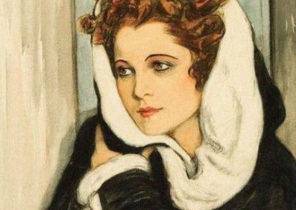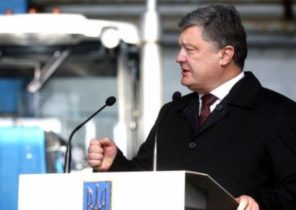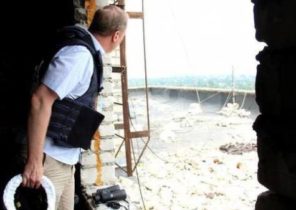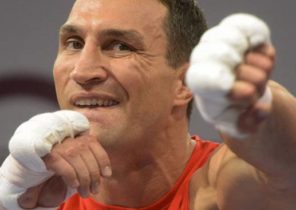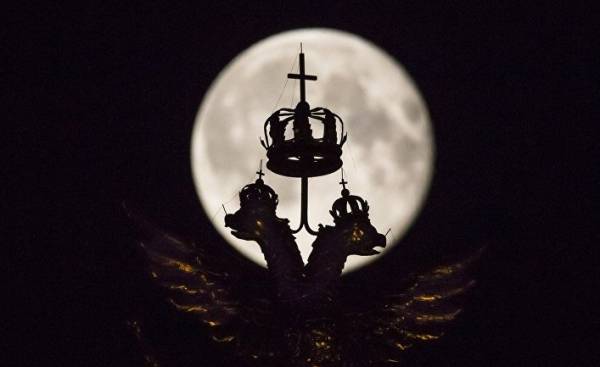
“For the Russian consciousness space is the greatest wealth. Not the achievements of science and arts, and conquering are the pride”, — says the Russian historian, Professor of the European University of St. Petersburg Evgenii Anisimov.
The presence in the minds of Russians unconscious Imperial is the cause of the Russians support the policies of the current authorities of Russia that returned the country to the Imperial rails. However, says the historian, to see the future in the past is impossible.
Despite the fact that Peter is known that punched a “window to Europe”, he didn’t like that Russia was a European country and system of government, even with the reforms of the Russian Emperor, Russia did not change until 1905. In addition, the historian, and now the monarchy in Russia restored almost: “We stand on the threshold of an era called “the autumn of the Patriarch”: the eternal President, eternal system of power and all that goes with it”.
In the course held in Vilnius Book fair was presented for the second translated into the Lithuanian language of the book is Evgeny Anisimov “Imperial Russia” concerning the times of the reign of Peter I (founder of the Empire) to Nicholas II (the last Emperor).
Yevgeny Anisimov known for his works on Russian history of the XVII-XVIII centuries, is the author of several books on Russian history, as well as a researcher of St. Petersburg Institute of history, Russian Academy of Sciences.
In an interview to DELFI he shared his thoughts on the cyclical nature of Russian history, the Imperial consciousness of Russians, the current situation is censored and in fact the presence of the monarchy in the country, as well as the possibility to agree on the historical events of Russia and the countries of Eastern Europe.
DELFI: At the Book fair introduced for the second translated into the Lithuanian language of your book on the history of Russia — “Imperial Russia”. Tell us a little about the book, what for you is the main, why you chose this time period — the period of Imperial Russia?
Yevgeny Anisimov: I do live in the Empire, and now too. I was interested in this work, which would allow to consider the different aspects of the life of the Empire, not delving into geopolitical issues. When we start a theoretical conversations about Empire, it fills me with longing. I’m more interested in how people lived (there are chapters that are read in school: the morning of a Russian landowner, for example) and the movement of the Empire, as it developed, were there any new phenomena as evolved human destiny and how it all existed from the beginning to the end. This is the subject of my studies throughout my life because I was always fond of Peter And Peter is the founder of the Russian Empire and the successor of many of the principles and origins that were laid with the formation of the Muscovite state.
Despite revolutionary reforms, Peter I continued the Moscow tradition?
— I would say that he did not want Russia to be a European country. He was interested in Western technology, the transfer of knowledge and the political regime remained unchanged. He used all that was possible to progress in the technical side, intelligent, but politically the system remained the same. Moreover, Peter’s reforms strengthened the regime, which was to him, and the power system remained virtually unchanged until 1905. Then under the influence of natural processes has changed, but they were not so significant to Russia has gone the European way.
— What is, in your opinion, the idea of the Russian Empire?
— General understanding of Imperial is a part of national mentality. This notion that space should be plenty. For the Russian consciousness space is the greatest wealth. Not the achievements of science and arts, and conquering are the pride. This space necessarily has to expand. And bad is the Russian Tsar, who did not. Why it happens is hard to say. The other point is the psychology of winners. I can’t even imagine what would happen to the USSR if it were not for the great Patriotic war. It greatly strengthened the regime, because the sense of space and victory must always be present. And in 1991 for the huge number of people in Russia is a defeat, and it is very hard experienced. It’s like the Treaty of Versailles. Therefore, the huge masses of people support Vladimir Putin: he returned to Russia to continue the trend.
— Actually if to speak about Russia’s Imperial ambitions?
— Reasoning — Yes. Imperial statements that have been made, and we all know, is like a revenge for the defeat that these people feel. For me and another three to four million people in 1991 — is the path to democracy and European development. And for tens of millions is lose. The government does not immediately realize the importance of this moment. But since the Imperial blood, that says power, found opinion. And Putin may be democratically selected at any one time, because he responded to these needs. It objectively, and I say this, maybe with regret, but it is reality. As for the various statements, they are intended for the public in the country.
— Let me quote: no need to teach past, not condescending to look at him. How, in your opinion, then you look at it?
— As a given. You need to look calmly, because none of us knows what tomorrow will bring. That’s the beauty of life: we cannot know exactly what will happen with us tomorrow. I am a historian — just an observer, not a participant. I tried in the nineties to participate in the political process, but quickly rejected it, because politics is a pretty dirty business, and it is a huge number of fools that it is hard to move when doing science.
In other words, from the time of the chronicler Nestor, the essence of the view of the past does not change. This fixation.
— Yes, it is the positivist fixation, but my feelings are bound to affect the text. I have a book “From Rurik to Putin”, which was transferred to Lithuania. I was approached one woman and said, “I offer your book as an example of the liberal perception of history.” And it’s very good, because have a different view, everyone can choose. Freedom to me is to write the way I want. And it is. In this sense, I’m not complex about the restrictions of some freedoms. This is probably a narrow view, but in my area I do not feel. With regard to the different incidents, the story tells me that now is a great time compared to what it was before. I sat in St. Petersburg on the car and came here, to anyone without giving a report. In many ways I understand that in Russia there is a certain podmorazhivanie, and it’s unavoidable. Remember the history of France: the four revolutions, and the monarchy, and Republic and dictatorship. But all this takes place.
— In your opinion, talking about the fact that now in Russia there is censorship, not true?
— Of course, the media are under censorship. But here’s the freedom — you don’t have to watch. I’m three years not watching TV. To me on mail delivery comes “Medusa”, I see that I was interested in, and zone out. Censorship exists for those who are zombified by TV. For intellectuals censorship as such, no.
— In this case to describe a situation similar to the noise surrounding the film by Alexei Uchitel “Matilda”?
— This is an example of idiocy. I think it is a Grand advertisement for the movie that hasn’t even been cleared. The fact that the government always needs ideology. She returned to the old, proven over the millennia, methods, when used for this purpose is the Church. But time has changed. The state is secular, and it remains secular. And attempts to appeal to the Church and its values is not productive. Of course, you can say that I do not see anything important, but each person defines the zone of freedom. But freedom need not to go out with slogans, it is that there’s always the possibility.
— You once wrote about the time of Lenin, then culture and science were within the sphere of government. Is it possible to apply it to the present?
— Yes and no. Yes, because only the government can Fund science and culture. We waited 20 years, when the rich Russian will give their money to universities, research culture, but it turned out that it is not. First, the selfishness of the bourgeoisie, as always, were original. Secondly, it is always servile, adapts to the state from which all got. But if there were no state there would be Academy of Sciences, I can say for sure.
— Probably because in many countries…
— Yes, because the development of science in the Western world is through the development of the University system, where there are institutions involved in science. We have not created. So without a state it is impossible. Of course, it imposes its paw, dictates certain conditions, not interfering in the concrete. By the way, so it was in Soviet times. I didn’t want to join the party and was engaged in financial reforms, Petersburg, and no one bothered me. On the other hand, in the modern world impossible intellectual dictatorship. Some of it slip out, get money from Western grants. Or go to a formal assignment. Extremes are, and remain serious things. Although, maybe you agree with this: during the dictatorship created a more intense story. This is, probably, that required a greater level of creativity to overcome obstacles. Now this is not required, and I sometimes think that many officials are eager to have their culturally repressed, because then you can appeal to the Constitution and many other things. I think that without a state, unfortunately, in Russia it is impossible cultural development. About Herzen said, the only European in Russia is the government.
— Your first published Lithuanian book was called “From Rurik to Putin.” The current situation in Russia has some historical Parallels?
— In Russia, unfortunately, the story very often goes around the circle, repeating the same mistakes. We can say that right now the history of Russia goes through the stage of Alexander III. It was called “warm autocracy”, was the era of the external unity of government and people, along with the strengthening of the role of the state, the police officer began and many phenomena in the field of culture. Maybe now the change in technique, but all these factors are again involved. But the fact that the epoch of Alexander III is inseparably connected with the epoch of Nicholas II. That is to say, what will be the result, it is difficult, because many phenomena, such as globalization, all significantly alter. I sometimes felt that we are on the threshold of an era called “the autumn of the Patriarch”: the eternal President, eternal system of power and all that goes with it. I don’t know if this is all in comparison with 1914, and in the Preface to this book, I wrote that Russia is at a crossroads: whether it will be included in the ecumene of the European States or, again, you choose your path that leads to nowhere? And again she chose this path.
— In one interview you said that “Russia is on the right track, and she did not pass democracy, it is in the European ecumene”. Do you see the desire of the current government to be with Europe and not Asia? The Russian authorities are now actively looking in the direction of Asia.
— They do not look to Asia, and in the past. I would say that after the chaos of the Russian statehood and the ideology of statehood (the first Romanov) was based on the fact to recover what it was before Ivan the terrible. But nobody remembered. That is, turns future into past. Now we, too, can see it. Revive elements of the Soviet system, although it can revive is absolutely not possible. Because the “loot” open borders, they (officials) children are studying abroad. But the people in power, people of my age, and I want to revive all with different sauces. And Imperial is very suitable for this. But is this possible in the modern world?
— Journalist Leonid Parfenov, once said that a continuous period of history for today’s Russians is the time of the Soviet Union because the Bolsheviks broke off the relationship. So the nostalgia for the Soviet past and finds its justification. You agree with that?
— I agree with that, because if you talk about the mentality of people, then it is better to live in a world where guaranteed salary, apartment, which will give the state. But that’s not all. People win elections because of the elderly. Youth to this has nothing, she’s not interested, they live in a different world, and I, too, live in this world, because less likely to rely on the state. The appeal to the Soviet has a certain audience, but young people do not understand. But to restore the past as the future is impossible in any case. The government suffers from a lack of ideology, it is not, and the ideology of freedom, which are guided in traditional democracies, it is unacceptable.
Soviet ideology: its elements, like suitable, but the whole it does not fit. On the other hand, Christianity as an ideology is also out. First, Russia is a multinational country, so to make the state Orthodox means to a big problem. This reminds of the cube to collect the car: one part from one machine, the other from the other, driving it is a very big risk. Therefore, periodically there is an appeal then to God, then to the Soviet past, to the old far. All this mix has no alternative to Islamic totalitarianism and European democracy.
— You called “the GULAG Archipelago” among the important books. If we look at Russia and, say, Lithuania, view of the events of that time are totally different. Why Russia is still the subject of extermination of its own citizens is not in the field, extensive discussions at the highest level, on the contrary, we see Stalin on the trolley, monuments open…
This book is at the time my mind turned. In General, people have a short memory, and from this comes the idealization of the Soviet era. In Russia, more precisely, in Christianity, suffering is a necessary part of faith. One elderly woman in the Pskov village where I live, at night went to Church for twenty kilometers. I offered her a ride, she said — not necessary, because I need these miles to go to enter this sweaty crowd, only then you can make contact with the God. I want to say that the item is necessary patience and suffering inherent in the Russian mentality. Therefore, in the Russian consciousness of the victim inevitable.
Or take the perception of battles, of death. For example, the battle of Borodino. On the one hand the French, on the other — Russian. The French clean uniforms, their battle is a feast. And for the Russian the battle field, the suffering, the threshold of death. And I think the sacrifices the people brought, seem natural to many that European man is not normal. The other thing is, and most importantly, that most of this shot in Stalin’s time, fell on their own people. In comparison with the Baltic States — the loss of people, property, anything that was irreplaceable. Nevertheless is an idealization of Stalin, because of all the negative fades into the background. I say, chop wood, chips fly, but think how powerful the state was created, we have a war did not survive.
— The fact of the matter is that such things in Russia and Lithuania, as well as in Eastern Europe overall, look the mirror opposite. Is there an opportunity to negotiate this issue when the national identity is built on completely different things?
— In the XVIII century by a Dutch entrepreneur said that it is good to have Russia as a friend but not neighbor. Of course, for the Baltic States present — day Russia- the legal successor of the USSR and the successor of this policy. It is more in the realm of ideology and is not related to a real military or any other matter, because Russia has no real power to do what was done in 1940. And I think that common sense wins out: it is impossible to do, but the danger felt.
I don’t know if there are opportunities to build relationships. Of course, they always have. With France Russia fought seven times, but French culture in Russia all the time existed. And when discussed in Council whether to leave Moscow, the Council was in French. There are things that overcome barriers and borders. I think that purely human contacts are always there. And the power… came alone Today, the other tomorrow.
— The Soviet Union — the same Empire. One gets the feeling, especially after the events in Ukraine, the Empire still collapsed. Don’t you think?
— If to speak about modern Russia, then Yes, this is serious. The idea that modern Russia is neraspavshemsya part of the Empire, exist. I have the impression that Russia in some form, but the Empire cannot exist. Possible transformation that can change the Imperial attitude? I think the 1990-ies has shown that it is possible.
You imagine, there would be no October revolution, Russia would have won with the allies in the war. I think everything would be fine? Would Poland, Lithuania, Finland, Ukraine. We cannot accurately predict the course of events. Authorities are trying to prevent this, after all, passed a law prohibiting separatist propaganda. But in the early 1990s passed miraculously compared to Yugoslavia. I do not regard the existing regime as the best, but I think it’s a transitional stage to the next, possibly democratic stage.
— Compatible with the ideas of Empire and democracy?
— The idea of the Empire and democracy were combined in England. Eventually everything was settled, while the Imperial consciousness has remained. Consciousness can exist, and it is inertial. And probably let people do that live in the Empire, but the reality and the new generation are changing. If you compare what is happening now in Russia, for example, France, then this is the era of Louis-Philippe. All the Nations have already passed. We are just now at such a stage, again reviving the monarchy — it is de facto already exists: the President who is elected always. Napoleon was chosen Emperor, about the same happens here. But to predict what will happen to us — is very difficult.
If you look at Russian history, what period would you single out as positive in terms of trends?
— The period of Alexander II. This is the era of the reforms that have been carried out in Russian, and very correct. Reforms are not immediately struck, as under Peter I, was a few years warming up of the society: reform has entered the consciousness of society that it is necessary and we must prepare for this. It was a program, and she me nice, because I was Westernizing because it was about the creation of a constitutional monarchy, the liberties. In Russia nothing can be done at once, a necessary stage fixture, rebuilding the brain. Unhappiness March 1, 1881 was that the people who killed the Emperor, did not seek to seize power, they also wanted democracy. And they were anxious to do it, but Alexander did it gradually. This period in Russian history, adequate condition and its prospects.
— There is another point which touches the very neighboring countries which were once part of the Empire. Russia, often even at the highest level, denying them statehood, independence, language.
— It’s in Russian is called “Imperial.” It’s in the blood of every person. Outside of Russia always very clearly perceive the terminology. I say “in Ukraine”, other — “Ukraine”. They do this not realizing that humiliate others.
Unconscious Imperial.
Yes. And sometimes power also expresses itself often based on their Imperial. Ukraine is not recognised as a nation. The fact that identity is defined here and now, in Russia do not understand, and go on a historical journey, claiming that Ukraine until a certain time was not even, as was Ruthenia. They begin to seek an explanation for the denial of the modern experience. Or take, for example, the novels of Sienkiewicz. There is no Lithuanian people. That is, the Imperial is inherent to many people, and Russian including. I believe that there are a number of things you should monitor: the sense of hunger, sense of sexuality, national, racial, gender, feeling. Educated person needs to consider these circumstances when dealing with people.
— What would you like to say to the reader who will take the second already translated into the Lithuanian language of your book?
— I’d like to read it, based on my good feelings to other people. I tried to write this book without looking in any books. And wanted was objectivity: I will bring the documents, giving notes in the margins, not to impose their views. For me this is important because all ideological systems collapse, the fact remains that human life and destiny. In General people are interesting people. This book I dedicated to the people, not schemes or concepts. As it turned out — the reader decide.
